Premium Only Content

Stairway To Heaven And Bonzo's Montreux Led Zeppelin
In 2002, a former music journalist named Michael Skidmore came into control of California's estate, and 2014 he began proceedings against Led Zeppelin. In 2016, Jimmy Page testified in the case and said that the first time he heard of the controversy when a few years earlier when his son-in-law told him that a debate had been brewing online. Page insisted he had never heard "Taurus" before, and that it was "totally alien" to him.
The jury didn't buy the argument that Page never heard "Taurus," but still ruled in favor of Led Zeppelin, deciding that the chord progression in "Taurus" was common to many other songs dating back decades, and therefore, in the public domain. In 2018, the case was sent back to trial on appeal, but the ruling was upheld two years later. Here's a timeline of the case.
Pat Boone released an unlikely cover on his album In a In a Metal Mood. Boone wanted to see how it would turn out as a jazz waltz, and opened and closed the song with soft flute playing. In a subtle reference to his Christian faith, Boone changed the line "All in one is all and all" to "Three in one is all and all" - a reference to the Christian Trinity (the Father, Son, Holy Spirit).
Before recording the song, he scanned it for devilish references. "I kept looking for allusions to witchcraft or drugs," he said in a Songfacts interview. "And even though there were strange images, like 'in the hedgerows' and all these things, there were no specific mentions of Jimmy Page's involvement in witchcraft or anything like that."
Another notable cover was by an Australian performer called Rolf Harris, who used a wobbleboard (piece of quite floppy wood, held at both sides, arched slightly and wobbled so the arch would continually invert) and changed the line "And it makes me wonder" to "Does it make you wonder."
In the '90s, Australian TV host Andrew Denton had a show on which various artists were asked to perform their version of this song. Their versions were released on an album called The Money or the Gun: Stairways to Heaven. Artists performing it included Australian Doors Show, The Beatnix, Kate Ceberano and the Ministry of Fun, Robyne Dunn, Etcetera Theatre Company, The Fargone Beauties, Sandra Hahn and Michael Turkic, Rolf Harris, Pardon Me Boys, Neil Pepper, The Rock Lobsters, Leonard Teale, Toys Went Berserk, Vegimite Reggae, The Whipper Snappers, and John Paul Young. In reply to Rolf Harris' version, Page and Plant performed his song "Sun Arise" at the end of another Denton TV show.
In January 1990, this song was added to the Muzak playlist in a solo harp version. Unlike the original, the Muzak version, arranged and recorded to provide an "uplifting, productive atmosphere" and "counteract the worker-fatigue curve in the office environment," did not do so well, as even this sanitized version drew a lot of attention to the song, thus undermining the intention of the Muzak programming.
The band performed this at the Atlantic Records 40th anniversary concert in 1988 with Jason Bonham sitting in on drums for his late father. Plant did not want to play it, but was convinced at the last minute. It was sloppy and Plant forgot some of the words. This was not the case when Jason joined them again in 2007 for a benefit show to raise money for the Ahmet Ertegun education fund. They performed this song and 15 others, earning rave reviews from fans and critics.
Zeppelin's longest ever performance of this song was their last gig in Berlin in 1980. It clocked in around 15 minutes long.
Gordon Roy of Wishaw, Scotland, had all of the lyrics to this song tattooed on his back. He did it as a tribute to a friend who died in a car accident.
In the late '90s, the radio trade magazine Monday Morning Replay reported that "Stairway" was still played 4,203 times a year by the 67 largest AOR (album-oriented rock) radio stations in the US. ASCAP, the American Society of Composers, Authors and Publishers, refuses to release exact figures on how many times it has been played since its release, but figure that on each AOR station in America, the song was played five times a day during its first three months of existence; twice a day for the next nine months; once a day for the next four years; and two to three times a week for the next 15 years. There are roughly 600 AOR and Classic Rock stations in the US, which means that "Stairway" has been broadcast a minimum of 2,874 times. At 8 minutes per spin, roughly 23 million minutes - almost 44 years - have been devoted to the song. So far.
On January 23, 1991, under the direction of owner and general manager John Sebastian, the radio station KLSK (104.1 FM) in Albuquerque, New Mexico played this song over and over for 24 hours, confounding listeners who weren't used to hearing Led Zeppelin on the station. The song played over 200 times, with many listeners tuning in to find out when it would end. It turned out to be publicity stunt, as the station was switching to a Classic Rock format.
Explaining his guitar setup for the solo, Jimmy Page told Guitar Player magazine in 1977: "I was using the Supro amp for the first album, and I still use it. The 'Stairway to Heaven' solo was done when I pulled out the Telecaster, which I hadn't used for a long time, plugged it into the Supro, and away it went again. That's a different sound entirely from the rest of the first album. It was a good, versatile setup."
The Foo Fighters did a mock cover of this song, and their version was to say that nobody should try to cover the song because they will screw it up. Dave Grohl intentionally carried the intro on way too long, asked his drummer and audience for lyrics, and when it came time for the guitar solo, he sang Jimmy Page's part. This was done purely as a joke, and to tell people not to cover the song, as Grohl is a huge Zeppelin fan, and lists Zeppelin's John Bonham as a major influence.
Rolling Stone magazine asked Jimmy Page how much of the guitar solo was composed before he recorded it. He replied: "It wasn't structured at all [laughs]. I had a start. I knew where and how I was going to begin. And I just did it. There was an amplifier [in the studio] that I was trying out. It sounded good, so I thought, "OK, take a deep breath, and play." I did three takes and chose one of them. They were all different. The solo sounds constructed - and it is, sort of, but purely of the moment. For me, a solo is something where you just fly, but within the context of the song."
Mary J. Blige recorded this in 2010 backed by Travis Barker, Randy Jackson, Steve Vai and Orianthi. Blige told MTV: "Once you get lost in the rock-and-roll moment of it, all you can do is scream to the top of your lungs or go as low as you need to go. It's not a head thing - it's a spirit thing." She added: "I am a Led Zeppelin fan. I've listened to their music since I was a child, and it's always moved me, especially 'Stairway To Heaven.' I make songs my own by going deep inside myself and translating them to 'what would Mary do.'" The song is included as a bonus track on the UK re-issue of her album Stronger With Each Tear and made available for download. Blige performed the song on the April 21, 2010 episode of American Idol.
In solo work or with other groups, Jimmy Page would not let anyone but Robert Plant sing this, but he did play it as an instrumental on occasion.
The ending of this song is distinctive in that is closes out with just Robert Plant's voice. According to Jimmy Page, he wrote a guitar part to end the song, but decided to leave it off since the vocal at the end had such an impact.
Jimmy Page often called "In The Light" from Physical Graffiti a follow-up to this song.
Regarding the composition of the track, Jimmy Page told Rolling Stone: "I was trying things at home, shunting this piece up with that piece. I had the idea of the verses, the link into the solo and the last part. It was this idea of something that would keep building and building."
Andy Johns, sound engineer on Led Zeppelin IV, told Guitare & Claviers magazine (January 1994) about the recording session for "Stairway To Heaven": "This song arrived completed. The arrangements had been done before the band entered the studio. We recorded the main tracks upstairs, in Island, with Jimmy on acoustic guitar, John Paul on a Hohner electric upright piano, and Bonham behind his kit. I tried to have a left hand sound coming out of the Hohner piano, in order to have something to re-record afterwards. As soon as we added the bass parts and Page started recording the overdubs, we could already tell it would be awesome. I knew it was a really special track and I was proud to take part in it. I didn't have the least idea, however, that it would become a f--king hymn for three generations of kids!"
During an interview with Rolling Stone in 1975, Page told journalist Cameron Crowe that the one artist who might be capable of achieving the artistic excellence of "Stairway To Heaven" was Joni Mitchell. He specifically mentioned Mitchell's song "Both Sides Now."
There have been two other completely different songs called "Stairway To Heaven" to chart in America. First in 1960 by Neil Sedaka (#9), and then in 1996 by Pure Soul with The O'Jays (#79).
"Stairway" was entered into the United States National Recording Registry in 2023, recognizing it as a historically significant work worthy of preservation. The essay to accompany the entry notes, "Early in his career as a studio musician Page had learned that one of the cardinal rules of studio work was to keep an even tempo, and resist the urge to speed up at all costs. Ironically, 'Stairway to Heaven' violates this rule to masterful effect, as it gradually increases speed, while adding instruments one at a time."
The man on the Led Zeppelin 4 album cover wasn't identified until 2023, 52 years after it was released. His name was Lot Long, and he lived in rural Wiltshire, England, making thatched roofs, which explains the bundle he's carrying on his back. The photograph, from 1892, was discovered by a researcher named Brian Edwards who happened to be a Zeppelin fan. Edwards found it in a photo album that had been put up for auction. The original photo used on the cover, which was lost long ago, was discovered in an antique shop.
"Bonzo's Montreux" is a drum solo by Led Zeppelin drummer John Bonham. It was recorded in September 1976 at Mountain Studios in Montreux, Switzerland, with electronic effects added by Jimmy Page. Page used the then-new Eventide Harmonizer to create a steel drum sound, which Bonham apparently liked; the final "gliss-phrases" were developed during mixing with the Harmonizer's keyboard controller. The track was released on the 1982 compilation album, Coda.
"Bonzo's Montreux" was never performed live at Led Zeppelin concerts, however, Bonham performed parts of the composition during "Moby Dick" in 1977.
-
 3:03:44
3:03:44
The Why Files
3 days agoCOMPILATION: Pyramids, Mounds and Mountains
29.2K58 -
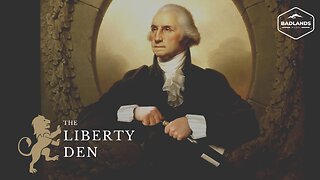 2:00:15
2:00:15
Badlands Media
21 hours agoThe Liberty Den Ep. 131
74.3K15 -
 2:05:26
2:05:26
TimcastIRL
6 hours agoTrump NUKES IRS, Mass Fed Layoffs, Democrats REVOLT Over 200k Layoffs w/Roma Nation | Timcast IRL
105K117 -
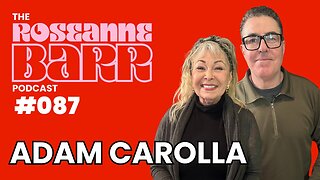 1:39:03
1:39:03
Roseanne Barr
10 hours ago $25.74 earnedAdam Carolla! | The Roseanne Barr Podcast #87
100K24 -
 1:29:04
1:29:04
Glenn Greenwald
9 hours agoTrump, Vance & Musk Announce a Radically New Foreign Policy Framework; Prof. Norman Finkelstein on Gaza's Future, the Cease-Fire Deal & Fallout from the U.S./Israeli War | SYSTEM UPDATE #407
110K84 -
 4:15:00
4:15:00
Nerdrotic
11 hours ago $42.50 earnedCaptain Falcon America REVIEW, Disney Ending DEI? Rings of Power RETURNS | Friday Night Tights #341
187K31 -
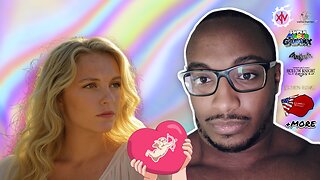 9:34:03
9:34:03
FusedAegisTV
19 hours agoMario Galaxy, Batman, Real Talk/Politics, & MORE - V-Day 💗 Friday Variety Stream!
39K1 -
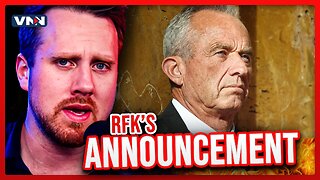 1:10:49
1:10:49
Vigilant News Network
8 hours agoRFK Jr. Drops a Stunning Announcement | The Daily Dose
62.2K39 -
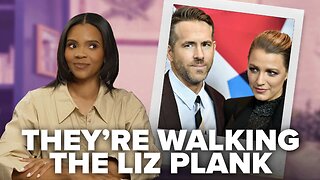 49:49
49:49
Candace Show Podcast
11 hours agoEXCLUSIVE: Blake & Ryan’s Desperate Legal Strategy Exposed! | Candace Ep 147
178K130 -
 1:32:20
1:32:20
2 MIKES LIVE
8 hours ago2 MIKES LIVE #180 with guest Kyle Rittenhouse!
46K3